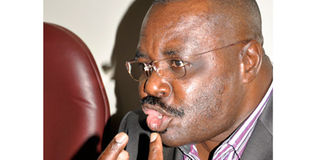Lack of research hindering House debate - Oulanyah

Mr Jacob Oulanyah addresses journalists in Kampala yesterday. PHOTO BY Geoffrey Sseruyange
What you need to know:
To improve debate, the Deputy Speaker proposed that parties submit names of MPs who would be selected to speak to the Speaker beforehand, an idea rejected by Parliament’s Business Committee.
The Deputy Speaker of Parliament has warned that lack of research amongst legislators is hampering the quality of debate in what he referred to as a “huge Parliament.”
Mr Jacob Oulanyah was addressing journalists at Parliament yesterday about his two-week sojourn in Europe that took him to Germany and France.
In his interactions there, he revealed that he was confronted about the Anti-Homosexuality Act assented to by President Museveni early this year, UPDF’s incursion into South Sudan and investment opportunities in Uganda.
On the Anti-Homosexuality Act that was criticised by Western countries as an attack on rights and led to donor aid cuts, Mr Oulanyah said he explained that it was initially passed by the British colonial government in 1950 and that the government would not use the law to target gays.
Mr Oulanyah said he told meetings in Berlin and Paris that UPDF went to South Sudan to protect President Salva Kiir because if “he had been killed, there would have been an automatic genocide”. On Uganda’s business climate, he warned that high interest rates are crippling investments.
To address the poor quality of debate in the House, the Omoro County Member of Parliament revealed that he proposed that parties submit names of Members of Parliament who would be selected to speak to the Speaker beforehand, an idea that was rejected by Parliament’s Business Committee.
The Business Committee determines the order of business in the House.
“You look at the quality of debate, look at the level of research. Someone just comes into the chambers and starts debating. I used to read the Hansard but I have stopped reading it. We miss the big picture because in our debates, we are so political because politics is the only thing that does not require research,” Mr Oulanyah said. “I have been ridiculed and criticised even by the Business Committee, that I am suppressing debate. We [MPs] have a different kind of expertise which we are not using well,” he said.
Last year, a Daily Monitor study of the first and second sessions of the current 9th Parliament revealed that 34 legislators have spoken less than five times on the floor of the House in the last two years while another 105 have contributed less than 15 times to debates.
A similar study indicated that 34 women Members of Parliament contributed to debate less than 15 times in the first two session of the 9th Parliament.



